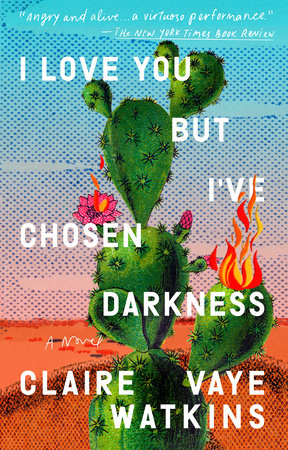I Love You but I’ve Chosen Darkness Reader’s Guide
By Claire Vaye Watkins


1. “Motherhood had cracked me in half. My self as a mother and my self as not were two different people, distinct.” The novel begins with the narrator responding to a postpartum depression questionnaire. How does Claire’s relationship to motherhood evolve throughout the book? What aspects of Claire as a mother seem incompatible with Claire “as not”? How does the book engage with motherhood and identity?
2. The novel includes some of Watkins’s father’s narrative of his life in the Manson Family and what may or may not be her mother’s letters. In a sense the narrator frames her account as a memoir of her own life. Yet the book also makes use of manifestly surreal elements, like the teeth Claire discovers inside her vagina. What do you make of the way the novel plays with reality, and subverts realism?
3. “I know happiness is a scam, but . . . unhappiness is real,” Claire says to her friends Ty and Rust in Reno. What do the different characters in the book –Claire; her parents, Martha and Paul; her sister Lise; her husband, Theo; and her lover Noah—make of happiness? How do they each envision it and pursue it? What does the novel have to say about joy?
4. In the novel, Claire is grieving her mother’s death from an overdose after her years of struggling with addiction. As an adult and now a mother herself, Claire views her mother’s story from new angles, including through the lens of a cache of her mother’s letters she discovers. How does adult Claire’s understanding of her mother’s life differ from her understanding when she was younger?
5. After speaking with her husband, Claire wonders, “Couldn’t we be decent and loyal and the same time completely free?” Throughout the novel, she reflects on freedom, as refracted though Charlotte’s Web, the hippie pioneers of the West, and her indefinable relationships with Jesse, Noah, and others. By the end, what has freedom come to mean to Claire, as a mother, a woman, a daughter, and an artist?
6. Remembering her teenage years, Claire writes, “I was indeed down to fuck. I was curious, liked exploring other bodies. I also liked to be liked, who doesn’t?” How are physical intimacy and self-exploration linked in the novel? What is the novel’s commentary on monogamy and other sexual conventions?
7. The narrator takes drugs at various points in the novel—to escape, to transcend to new truths, and finally, to commune with her mother. What does the novel suggest about the limitations and possibilities of altered states of consciousness?
8. Over the course of the novel, the narrator is contending with two families that loom large in her past and present: her complicated family of origin and the nascent nuclear family from which she’s just taken flight. How does engaging with one alter how she sees and relates to the other? How does revisiting the memory of her parents and her relationship with her siblings and grandmother reframe the obligations she feels toward Theo and their daughter?
9. When the narrator escapes to be with Noah, he says they are “simply living very much in the now.” How does the novel invoke and complicate our sense of time, from Claire’s abrupt and elongating flight from her life in the Midwest to the artifacts of her and her family’s past to the history rising from the landscape?
10. In the desert near the Watkins ranch, Claire stays awhile with a makeshift “family” and then lives alone in the desert. How do these developments parallel her father’s experience as a young man living with the Manson Family? What other legacies, welcome or not, has Claire inherited from her parents, intentionally or unintentionally?
11. Claire has a lifelong affinity with the desert and the Amargosa River that flows through it, a love cast into painful relief by her knowledge of the environmental ravages people continue to perpetrate on and in this landscape. What does the novel have to say about how we exist within the grief of environmental collapse?
12. Throughout the book, Claire wrestles with the same question her father did when he got cancer: “You want to look at your life and, uh, get it back in the productive mode? You want to really live it, or do you want to continue to rape, pillage and plunder?” What is Claire’s version of this question, and what is her ultimate answer?
Just for joining you’ll get personalized recommendations on your dashboard daily and features only for members.
Find Out More Join Now Sign In